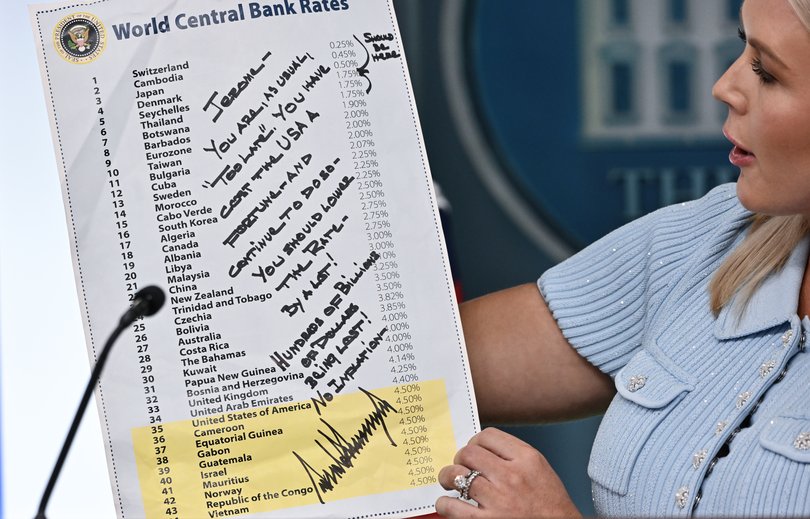Consumed by Epstein, Trump has lost ground on the economy and immigration
WASHINGTON POST: Donald Trump spent much of last week trying to fend off a revolt in his base over the Jeffrey Epstein case, but he has more than just problems with his own MAGA followers.

President Donald Trump spent much of last week trying to fend off a revolt in his base over the Jeffrey Epstein case, but he has more than just problems within his own MAGA followers.
He has lost ground with the broader public on issues that once were among his strongest attributes.
A year ago, voters saw Mr Trump as a better steward of the economy than Vice President Kamala Harris. His tough talk on immigration appealed to many voters who saw the southern border as out of control and who blamed the Biden Administration for the huge influx of undocumented migrants.
Sign up to The Nightly's newsletters.
Get the first look at the digital newspaper, curated daily stories and breaking headlines delivered to your inbox.
By continuing you agree to our Terms and Privacy Policy.Now he’s getting negative reviews on both.
A new Gallup poll shows a remarkable turnaround in public sentiment about aspects of immigration policy. Other recent surveys find significant dissatisfaction with Mr Trump’s handling of the economy.
When he was sworn in, Mr Trump promised a new “Golden Age.” It’s clear that, six months into his presidency, the public isn’t buying all the hype.
Mr Trump would like nothing better than to point to successes in his second term, and he has had some. The swirling Epstein controversy makes that difficult. Mr Trump has tried to dismiss the controversy as Democratic-manufactured fakery, though this was always an issue generated by conspiracy theorists in the President’s base.
He wants Attorney General Pam Bondi to seek the release of pertinent grand jury testimony, a dodge that doesn’t address demands for full transparency.
For now, he seems stuck, unless his threatened lawsuit against the Wall Street Journal over a story that says he sent a risqué 50th birthday note to Epstein (which he denies) consolidates his base.
The White House would like to change the subject, but when press secretary Karoline Leavitt tried to do that at the top of her Thursday briefing, her lengthy opening statement helped to highlight apparent concerns about public sentiment on both the economy and immigration.
Ms Leavitt reeled off statistics trying to make the case that the economy is working for people. She provided citations of arrests as evidence that Trump is ridding the country of migrants with violent criminal records.

It will take more than that to drown out the Epstein controversy and change public opinion about his other policies.
This comes at a moment when the President has notched some clear successes. Congress approved the big tax cut and immigration bill. The Supreme Court has given him some victories, including a green light to fire thousands of federal workers.
The airstrike on Iran’s nuclear facilities has brought a ceasefire between Iran and Israel and set back Iran’s nuclear program. NATO nations have agreed to increase defense spending.
This past week Mr Trump agreed to send Patriot air defense systems to Ukraine, paid for by the Europeans.
That decision came after his public complaints about Russian President Vladimir Putin’s continued assault on Ukraine and public perceptions that the Russian leader has played the American President on the issue of a ceasefire and settlement of the war.
Mr Trump also has delivered on his campaign promise to tighten security at the US-Mexico border. Illegal crossings are at a low point.
His problem is that people don’t like other aspects of his immigration policy: the aggressive roundups of undocumented and sometimes legal migrants, the deployment of U.S. military forces to Los Angeles to quell protests, numerous legal battles over the deportations that have pitted the administration against the courts.
All have contributed to the reshaping of public opinion. The result is something Mr Trump could never have imagined when he was sworn in: The public now sees the value of immigration more positively and widespread deportations and the Administration’s enforcement tactics less positively.

Last year, 55 percent of Americans said they wanted a reduction in immigration, according to Gallup. Today, that’s dropped to 30 percent. Gallup also notes that a record 79 percent of Americans say immigration is a good thing for the country. That’s a 15-point jump in the past year.
Meanwhile, support for hiring more border agents, which is supposed to happen under the new “big, beautiful bill” the President signed on July 4, has declined by 17 points in the past year. Support for deporting all undocumented immigrants has dropped nine points, to 38 percent.
In the Gallup poll, support for allowing undocumented immigrants to become US citizens has risen eight points to 78 percent - though that’s a bit lower than the 84 percent in 2016. The percentage of Republicans who support a path to citizenship has risen from 46 percent a year ago to 59 percent today.
The Post’s average of high-quality polls shows a clear deterioration in Mr Trump’s approval rating on immigration. In May, the average showed Americans evenly divided. The average so far in July shows 42 percent saying they approve and 54 percent disapproving.
The protests that erupted in early June appear to be the catalyst for a reappraisal of Mr Trump on immigration. Before the protests, his immigration approval rating was 49 percent positive, 49 percent negative. Since then, the average of the post-protests polls shows his standing at 42 percent positive, 54 percent negative.
Before he was sworn in, public expectations for Mr Trump were highest on the economy and immigration, according to a Washington Post-Schar School poll of swing state voters.
In that survey, 62 percent said they expected Mr Trump to do an “excellent” or “good” job on the economy and 59 percent said they thought he would do an “excellent” or “good” job on immigration.
Also, 46 percent said they thought his presidency would help their finances, with 31 percent saying it would hurt them financially.
Until the pandemic took hold in the spring of 2020, Mr Trump enjoyed relatively strong ratings on the economy. Things deteriorated during the pandemic and judgments were about evenly divided just before the 2020 election.
Today the public is dissatisfied with his economic performance. An Associated Press-NORC Center for Public Affairs survey last week showed that 38 percent approved of his economic management and 60 percent disapproved.
A Quinnipiac University poll put his economic approval numbers only slightly better: 43 percent approving, 55 percent disapproving.
In the AP-NORC poll, nearly half (49 percent) said his policies have done more to hurt them than help them. About 1 in 4 (27 percent) said they have done more to help them.
The rest said the policies have not made a difference. A majority said the new tax bill will do more to help the wealthy and that it will hurt people with lower incomes. In the Quinnipiac poll, 40 percent said they approved of his handling of trade, with 56 percent disapproving.
Predictions that Mr Trump’s tariffs will trigger a major new bout of inflation have not been borne out, though all the tariffs are not in place. The Federal Reserve has been cautious about cutting interest rates because of the uncertainty around the tariffs.
Mr Trump continues to badger Federal Reserve Chair Jerome H. Powell, whom he would like replaced, to cut those rates substantially.
Many economists say a cut of the size Mr Trump wants would risk an inflationary spike.
There’s history to buttress those concerns. In 1972, President Richard M. Nixon pressured Fed Chair Arthur F. Burns, and the subsequent loosening of monetary policy helped unleash an inflationary rise.
Mr Trump continues to accumulate power in the presidency and exercise it to change government and major institutions. He plays a dominant role in the world.
But his six-month report card provides indications that the public hasn’t fully bought into his program, warnings that he can’t easily ignore.
© 2025 , The Washington Post
